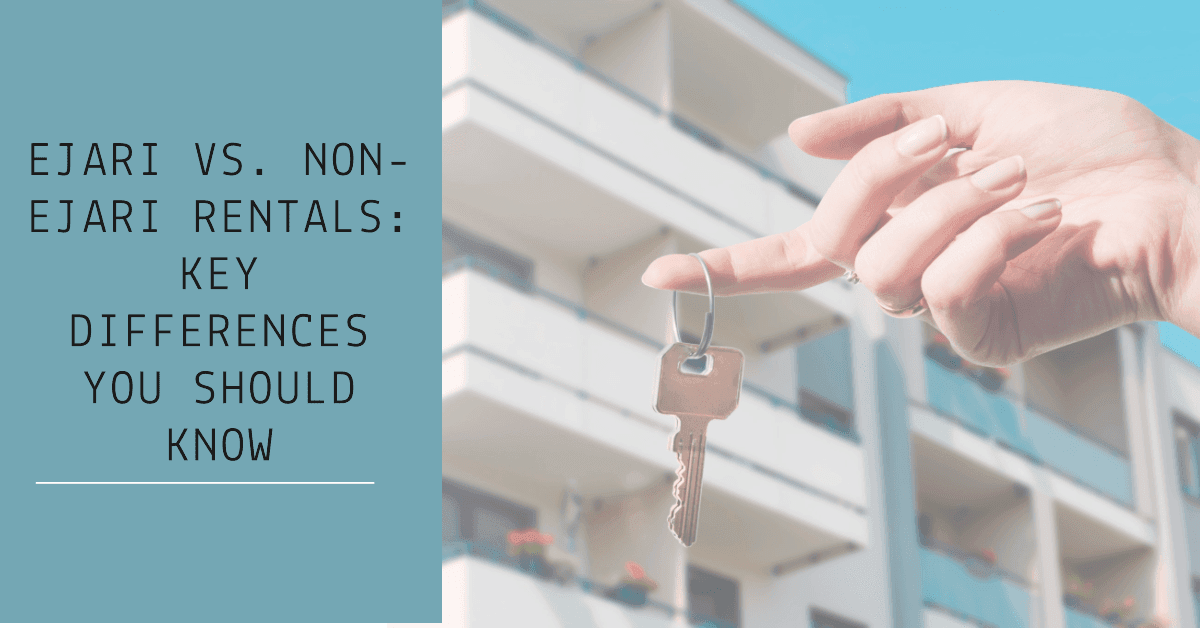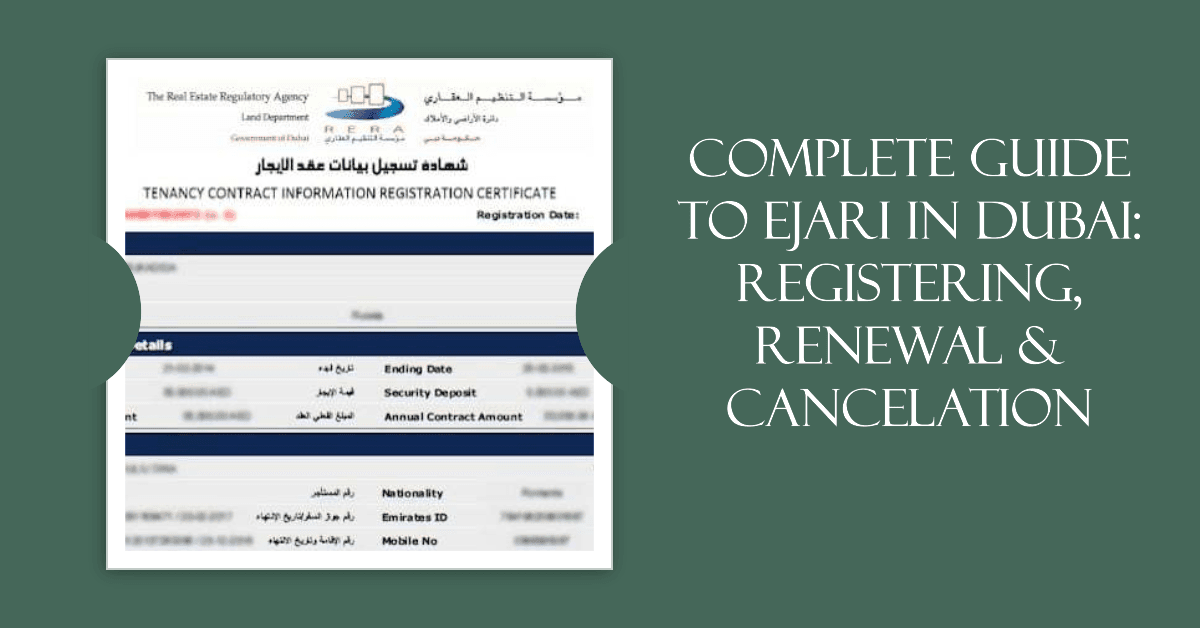Whether you’ve rented a place before or if this is your first time, knowing the difference between Ejari and non-Ejari rentals is super important. It might sound a little complicated, but it’s actually really useful information. It can help you have a smooth time renting a place and keep you legally protected too.
By the time you finish reading, you’ll know everything you need to make good choices when renting a place. Let’s go!
What is an Ejari vs. Non-Ejari Rental?
Ejari is an online system in Dubai that makes sure all rental agreements are official. It was set up by a group called RERA in 2010. No matter if you’re renting a home or a place for business, you need to use Ejari. It’s like rules to keep things fair and clear.
But a non-Ejari rental is different. It’s a deal that isn’t in the Ejari system. This means the government doesn’t recognize it in the same way. This also means the rules to protect renters and landlords are different.
Some landlords or renters might choose a non-Ejari deal. For example, the landlord might not want to pay AED 225 to register with Ejari. Or the renter might not want the landlord to check their credit history.
But, going for a non-Ejari rental has risks. If there’s a fight between the landlord and renter, the non-Ejari deal might not count in court. Also, if you’re living in a non-Ejari place, you might have trouble extending your visa.
Differences Between Ejari and Non-Ejari Rentals
Legal Protection
Ejari rentals offer more legal protection for both tenants and landlords. This is because Ejari rentals are registered with the Real Estate Regulatory Agency (RERA), which means that they are subject to RERA’s regulations. Non-Ejari rentals are not registered with RERA, so they do not have the same level of legal protection.
Tenant Rights and Protections under Ejari
Tenants in Ejari-registered agreements have a number of rights and protections, including:
- The right to a safe and habitable property
- The right to be notified of any rent increases in writing at least 90 days in advance
- The right to renew their lease at the end of the contract term
- The right to be compensated for any damages to the property caused by the landlord
- The right to file a complaint with the Rental Dispute Settlement Centre (RDC) if they have a dispute with their landlord
Implications for Tenants in Non-Ejari Rentals
People who rent in non-Ejari places don’t have the same protections as those in Ejari places. This can make them more open to being treated unfairly by landlords.
For example, a landlord might suddenly raise the rent without telling the tenant, or they could kick out the tenant without a good reason.
If you’re renting a non-Ejari place, it’s really important to know your rights and do things to keep yourself safe. Here’s what you should do:
- Get it in writing: Make sure you have a paper that clearly says what you and the landlord agreed on, like how much rent you pay, the security deposit, and when you can leave.
- Keep proof: Save all the papers that show you paid rent and any other important stuff about your rental.
- Know the rules: Learn about the laws that help tenants in the UAE.
- Speak up: If you have a problem with the landlord, be ready to tell someone about it, like the RDC (that’s a place that helps with rental issues).
Security Deposit
The security deposit for Ejari rentals is usually one month’s rent, while the security deposit for non-Ejari rentals can be up to three months’ rent.
Documentation
Ejari rentals require more documentation than non-Ejari rentals. This includes a copy of the tenant’s passport, visa, and Emirates ID, as well as a copy of the landlord’s tenancy license. Non-Ejari rentals do not require as much documentation.
Flexibility
Ejari rentals are generally less flexible than non-Ejari rentals. This is because Ejari rentals have a fixed term, which cannot be changed without the consent of both the tenant and landlord. Non-Ejari rentals are more flexible, as the terms can be changed more easily.
Cost
Ejari rentals are usually more expensive than non-Ejari rentals. This is because Ejari rentals require the payment of a registration fee to RERA.
Factors to Consider When Choosing Ejari or Non-Ejari Rentals
There are a bunch of things that can help you decide whether to go for an Ejari-registered agreement or a non-Ejari rental. Here they are:
- Your budget: Ejari-registered places usually cost more than non-Ejari ones. That’s because Ejari agreements give you extra protection, and landlords charge more for that.
- Your rights and safety: Remember we talked about how Ejari gives you more rights and safety? If you want the most protection, then an Ejari agreement is a better choice.
- How the rental market works: The rental market in Dubai is always changing. In some places, you might find more non-Ejari places available. In other spots, it could be the opposite. It’s super important to research and learn about the rental market where you want to live.
Financial Considerations
Besides what we talked about earlier, there are a few more money-related things to think about when you’re choosing between Ejari and non-Ejari rentals. Here they are:
- Security deposit: This is like a payment to make sure you take care of the place. In Ejari rentals, it’s usually the same as one month’s rent. But in non-Ejari rentals, it can be more or less depending on the landlord.
- Agency fees: These are payments for the people who help you find the place. You usually pay these fees for both types of rentals. But the amount can change depending on the agency.
- Utility bills: These are the bills for things like water, electricity, and gas. In Ejari rentals, you might split these bills with the landlord. But in non-Ejari rentals, the landlord might pay all of them.
Remember, it’s really important to think about all these money things when you’re deciding. The right choice for you depends on what works best for you and what you like.
Conclusion
So, to put it simply, it’s really important to know the difference between renting a place with Ejari and without Ejari.
Ejari is like a set of rules and protections for both renters and landlords in Dubai. It makes sure that rental agreements are fair and clear, and if there’s a problem, it helps to solve it fairly. On the other hand, if you rent without Ejari, you might have more freedom to negotiate and set your own terms, but there’s a risk because there aren’t as many rules to protect you. So, when you’re deciding whether to go with Ejari or not, think about what matters most.







